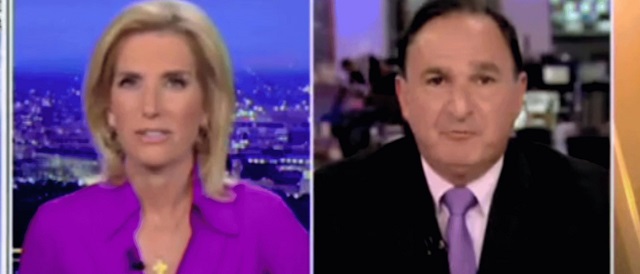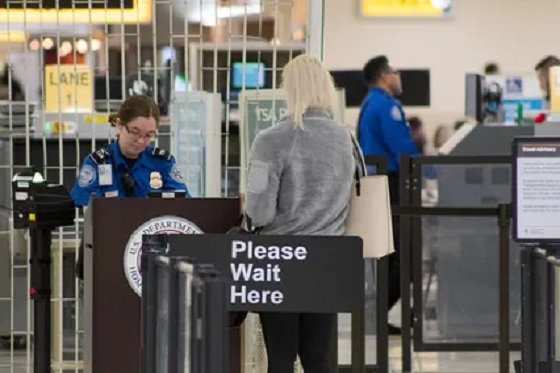International
Former Secret Service Agent Suggests Agency Has Political Bias Against Trump Following Second Assassination Attempt

From the Daily Caller News Foundation
A former Secret Service agent alleged on Tuesday that political bias has permeated the agency, following a second assassination attempt on former President Donald Trump, during an appearance on Fox News. (Screenshot/Fox News)
A former Secret Service agent alleged on Tuesday that political bias has permeated the agency following a second assassination attempt on former President Donald Trump.
In an appearance on “The Ingraham Angle,” former Secret Service agent Richard Staropoli accused the Secret Service of allowing “personal political feelings to permeate the senior most levels,” and suggested a breakdown in the nonpartisan integrity that the service is mandated to uphold. Staropoli further alleged that bias has trickled down to field agents, potentially compromising their duty to protect.
“He [Trump] describes it as the most dangerous business, a very dangerous business, it shouldn’t be. This is why the Secret Service exists, yet somewhere along the line, they’ve allowed their own personal political feelings to permeate the senior most levels of the Secret Service,” Staropoli told Laura Ingraham. “And that has made its way down to the level of the field agents, the Secret Service is broken. They are not doing their job.”
WATCH:
Trump described campaigning as a “dangerous business” during a Tuesday Town hall in Michigan, according to USA Today. Trump hosted the town hall just days after Secret Service agents foiled an assassination attempt at his Florida golf course on Sunday, which follows a previous attack in July where Trump was wounded and an attendee killed at a Pennsylvania rally.
With a career spanning over two decades, including high-stakes assignments with Presidents Clinton and Bush, Staropoli said he understood the pressures and challenges of the job, however, the recent failures around Trump’s security disturbs him. He argued that the agency should have anticipated the threat at a location Trump frequented.
“The Secret Service with a $4 billion budget and 7 ,000 employees can’t predict and can’t pre-post an event that’s going to happen on a golf course,” he added. “That the president not only owns but has been golfing on every Sunday for the last 20 years.”
Staropoli delved into the details of the first assassination attempt allegedly orchestrated by Thomas Crooks, emphasizing the agency’s missteps throughout the process.
“Let’s add in the fact that you exposed of the body the way too quickly, you contaminated that crime scene and quite simply has any Secret Service agent even interviewed the family what what’s going on here,” he added. “They have left totally unresolved questions and have fed into conspiracy theories that we will be talking about 50 and 60 years from now, this could have all been avoided if the acting director simply would have stepped in front of the cameras right from the outset.”
The Secret Service requested a budget increase from Congress following the second assassination . Amidst negotiations, some lawmakers advocated for more funds while others demanded new leadership.
The Secret Service did not immediately respond to the Daily Caller News Foundation’s request for comment.
Crime
Tucker Carlson: US intelligence is shielding Epstein network, not President Trump

From LifeSiteNews
By Robert Jones
Pam Bondi’s shifting story and Trump’s dismissal of Epstein questions have reignited scrutiny over the sealed files.
Tucker Carlson is raising new concerns about a possible intelligence cover-up in the Jeffrey Epstein case—this time implicating U.S. and Israeli agencies, as well as Trump ally and former Florida Attorney General Pam Bondi.
During a recent broadcast, Carlson discussed U.S. Attorney General Bondi’s refusal to release sealed Epstein files, along with the FBI and DOJ announcement that Epstein did not have a client list and did indeed kill himself.
Carlson offered two theories for Bondi’s words. The first: “Trump is involved—that Trump is on the list, that they’ve got a tape of Trump doing something awful.”
But Carlson quickly dismissed that idea, noting he’s spoken to Trump about Epstein and believes he wasn’t part of “creepy” activities. He also pointed out that the Biden administration holds the evidence and would likely have acted if there were grounds.
10 Shocking Stories the Media Buried Today
#10 – Tucker Carlson has two theories why Pam Bondi won’t release the Epstein Files.
Theory #1: “Trump is involved.”
But Tucker thinks this explanation is not very likely.
That brings us to Theory #2, which is that Tucker believes… pic.twitter.com/Wy8l5NWQvZ
— The Vigilant Fox 🦊 (@VigilantFox) July 8, 2025
Carlson’s second theory: the intelligence services are “at the very center of this story” and are being protected. His guest, Saagar Enjeti, agreed. “That’s the most obvious ,” Enjeti said, referencing past CIA-linked pedophilia cases. He noted the agency had avoided prosecutions for fear suspects would reveal “sources and methods” in court.
The exchange aired as critics accused Bondi of shifting her account of what’s in the files. She previously referenced “tens of thousands of videos of Epstein with children,” but later claimed they were videos of child pornography downloaded by Epstein. Observers say that revision changes the legal and narrative stakes—and raises questions about credibility.
#9 – Pam Bondi changes the story on the “tens of thousands of videos of Epstein WITH children.”
BEFORE: Tens of thousands of videos of Epstein WITH children.
AFTER: Tens of thousands of videos of child p*rn were DOWNLOADED by Jeffrey Epstein.
Credit: @Ultrafrog17 pic.twitter.com/v5I2uulyzA
— The Vigilant Fox 🦊 (@VigilantFox) July 8, 2025
Donald Trump also appeared impatient with the matter. “Are you still talking about Jeffrey Epstein? That is unbelievable,” he said in a video beside Bondi. This clip sparked backlash from longtime Trump supporters, including former Trump advisor Elon Musk, who reposted critical commentary on Trump and Bondi’s comments on X:
Musk previously alleged that Trump was himself implicated in the Epstein files. Although he retracted and apologized for this, he recently suggested that Steve Bannon was also implicated.
However, Carlson’s guest suggested that Bondi’s comments had another purpose. “The lie is a signal to everybody else involved,” he said. “The lie is not for you and me. The lie is for those implicated to say, ‘No matter what, we will protect you.’”
#7 – Guest leaves Tucker Carlson speechless with an interesting theory about the Epstein File cover-up.
“The lie is a signal to everybody else involved in the scheme that to the ultimate ends, the United States government will go to protect all of you.”
“The lie is not for you… pic.twitter.com/DWm3VwBmwF
— The Vigilant Fox 🦊 (@VigilantFox) July 8, 2025
The files in question remain sealed. It is unclear whether further revelations about Epstein will come to light, but Trump’s comments are not going to make the issue go away.
International
No more shoes off: Trump ends TSA’s decades-old rule

 MxM News
MxM News
Quick Hit:
The Trump administration is phasing out one of the most despised airport security policies in America: the requirement to remove shoes during TSA screening.
Key Details:
- Passengers will no longer be required to remove their shoes at airport security checkpoints in coming weeks.
- The change is rolling out at Baltimore, Fort Lauderdale, Cincinnati, Portland, Philadelphia, and Piedmont Triad airports.
- White House Press Secretary Karoline Leavitt confirmed the policy reversal on Tuesday morning.
Diving Deeper:
The Trump administration announced it is ending the much-loathed Transportation Security Administration rule requiring passengers to remove their shoes during security checks, a mandate that has frustrated Americans since its introduction nearly two decades ago.
The change is being implemented first at Baltimore/Washington International Airport, Fort Lauderdale International Airport, Cincinnati/Northern Kentucky International Airport, Portland International Airport, Philadelphia International Airport, and Piedmont Triad International Airport in North Carolina, according to CBS News. The policy will expand to additional airports nationwide in the coming weeks.
White House Press Secretary Karoline Leavitt shared the news on X, posting, “Big news from [the Department of Homeland Security]!” Tuesday morning. A TSA spokesman told The New York Times that “TSA and DHS are always exploring new and innovative ways to enhance the passenger experience and our strong security posture,” suggesting the policy change is part of broader improvements under President Trump’s leadership.
The policy to remove shoes was first instituted in 2006, stemming from the December 2001 attempt by Richard Reid, known as the “shoe bomber,” to ignite explosives hidden in his shoes on a flight from Paris to Miami. Reid was sentenced to life in prison after pleading guilty to terrorism charges, but critics have argued the policy punishes every American traveler for the actions of one terrorist nearly 25 years ago.
Before the update, travelers in the TSA PreCheck program were already exempt from removing shoes, belts, and jackets. Now, under President Trump’s directive to reduce pointless regulatory burdens, the policy is being eliminated for all travelers.
-

 MAiD2 days ago
MAiD2 days agoCanada’s euthanasia regime is already killing the disabled. It’s about to get worse
-

 Daily Caller15 hours ago
Daily Caller15 hours agoUSAID Quietly Sent Thousands Of Viruses To Chinese Military-Linked Biolab
-

 Alberta12 hours ago
Alberta12 hours ago‘Far too serious for such uninformed, careless journalism’: Complaint filed against Globe and Mail article challenging Alberta’s gender surgery law
-

 Censorship Industrial Complex23 hours ago
Censorship Industrial Complex23 hours agoCanadian pro-freedom group sounds alarm over Liberal plans to revive internet censorship bill
-

 Fraser Institute1 day ago
Fraser Institute1 day agoBefore Trudeau average annual immigration was 617,800. Under Trudeau number skyrocketted to 1.4 million from 2016 to 2024
-

 International2 days ago
International2 days agoChicago suburb purchases childhood home of Pope Leo XIV
-

 Daily Caller2 days ago
Daily Caller2 days ago‘I Know How These People Operate’: Fmr CIA Officer Calls BS On FBI’s New Epstein Intel
-

 Economy1 day ago
Economy1 day agoThe stars are aligning for a new pipeline to the West Coast


